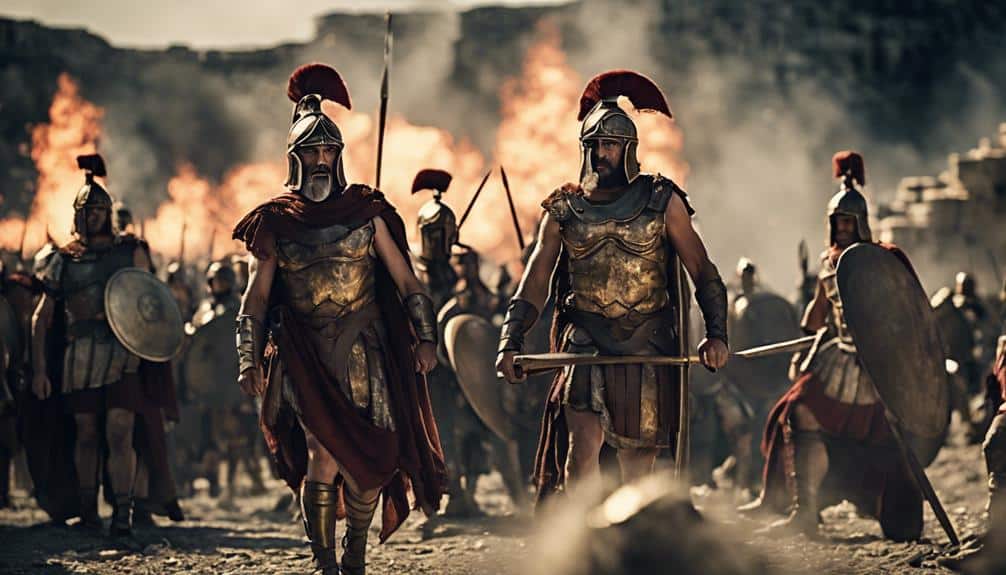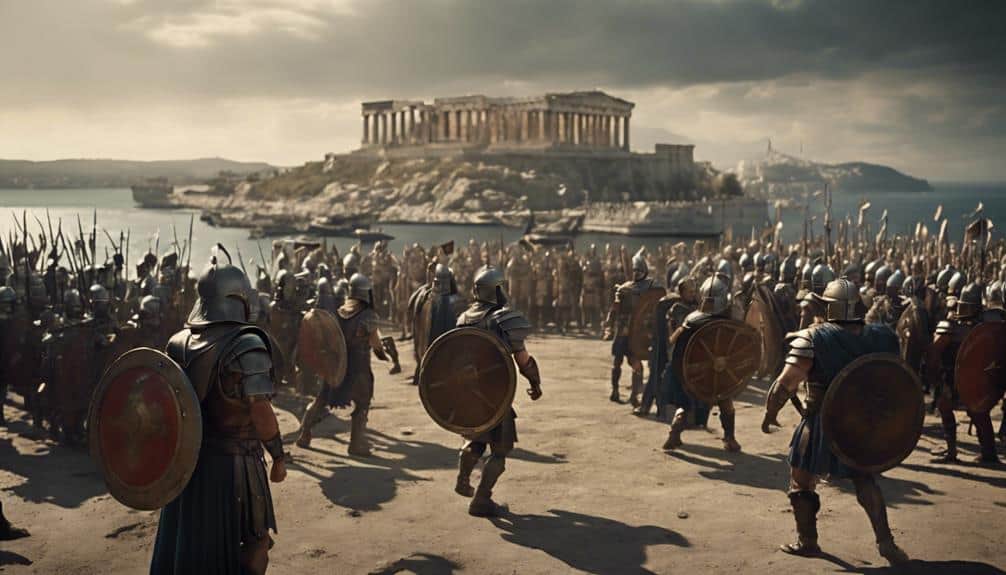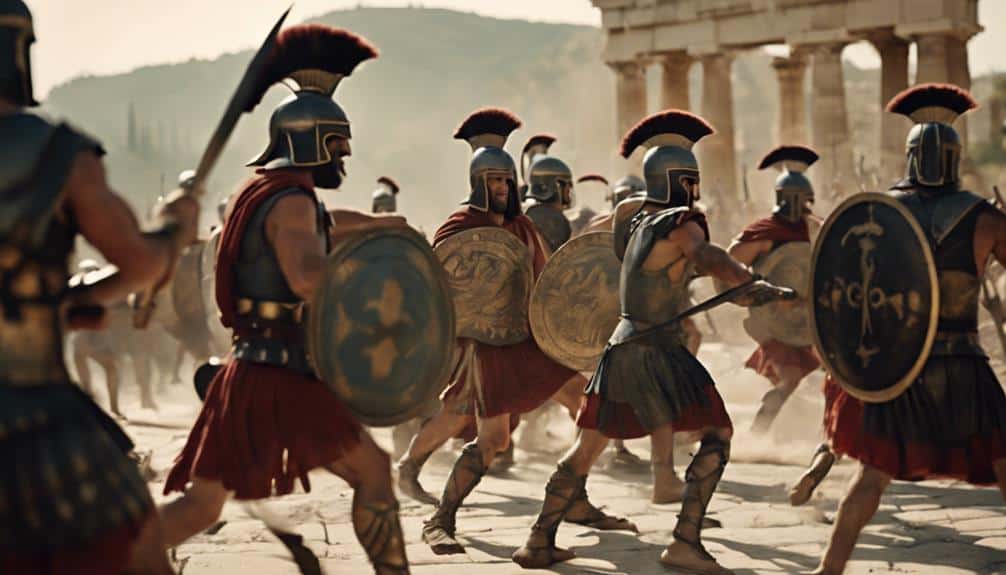Dive into the epic struggle of the Peloponnesian War, where Athens' naval prowess clashed with Sparta's land dominance from 431 to 404 BCE.
Discover how key battles and influential leaders like Pericles and Lysander shaped ancient Greek history and altered its power dynamics forever.
Background and Causes
The Peloponnesian War, fought from 431 to 404 BCE, arose from deep-seated tensions between Athens and Sparta over their divergent political systems, economic interests, and alliances. Athens, with its democratic government and powerful navy, clashed with Sparta's oligarchic system and formidable land-based military. These political differences created a landscape ripe for conflict.
Economically, Athens thrived on trade and maritime dominance, while Sparta relied on its agricultural economy and control over the Peloponnesian League. Athens' imposition of the Megarian Decrees, which restricted trade with Megara, a Spartan ally, exemplified these economic tensions. Such actions were perceived as threats to Spartan interests.
The treatment of allies further strained relations. Athens' Delian League often enforced strict control over its member states, demanding loyalty and tributes. In contrast, Sparta led the Peloponnesian League with a more hands-off approach, fostering resentment among those under Athenian rule.
Diplomatic efforts failed when Sparta demanded that Athens retract the Megarian Decrees and cease its aggressive policies. Athens' refusal led to the breakdown of negotiations, igniting the Peloponnesian War. This conflict reshaped Greek politics, society, and power dynamics, leaving a lasting impact on the region.
Major Battles

Amidst the Peloponnesian War's tumult, key battles like the Siege of Melos and the Sicilian Expedition highlighted the strategic ingenuity and brutal intensity that defined this ancient conflict.
The Siege of Melos in 416 BCE demonstrated Athens' ruthless ambition. The Athenians besieged the neutral island of Melos, showcasing their dominance in land sieges and naval strength. The Melians resisted but ultimately fell, illustrating the shifting power dynamics favoring Athens at that time.
Conversely, the Sicilian Expedition (415-413 BCE) marked a significant miscalculation for Athens. Seeking to expand their influence, the Athenians launched a massive military campaign against Syracuse. Despite their impressive naval strength, the expedition ended disastrously. The Athenian fleet was decimated, and their soldiers were either killed or enslaved, signaling a pivotal shift in power back towards Sparta.
Other notable battles, such as the Battle of Potidaea in 432 BCE and the Battle of Arginusae in 406 BCE, further exemplified the evolving military strategies and fierce competition between the two city-states.
The Battle of Aegospotami in 405 BCE, where Sparta's naval forces decisively defeated the Athenian fleet, ultimately sealed Athens' fate, leading to their surrender and the war's conclusion.
Key Leaders

To understand the Peloponnesian War, you must examine the key leaders who shaped its course. Leaders like Pericles, Lysander, and Alcibiades influenced war strategies, political dynamics, and major battles.
Their decisions and actions had lasting impacts on both Athens and Sparta, ultimately determining the war's outcome.
Influential War Strategists
Pericles' strategic vision and leadership catapulted Athens into the early stages of the Peloponnesian War, setting the stage for a conflict that would reshape Greek history. His focus on fortifying the city and relying on the Athenian navy showcased his understanding of Athens' strengths. Pericles aimed to protect Athens from direct land assaults while leveraging its naval superiority to disrupt Spartan alliances.
However, the tide turned with the emergence of Lysander. As a Spartan admiral, Lysander's naval strategy proved decisive. He secured Persian financial support, built a formidable fleet, and eventually delivered the crushing blow at the Battle of Aegospotami, leading to Athens' surrender.
Alcibiades, a controversial Athenian general, had a turbulent career marked by shifting allegiances. Initially a proponent of aggressive expansion, his role in the Sicilian Expedition resulted in a catastrophic defeat for Athens. Although he later defected to Sparta and then Persia, his strategic insights were ultimately overshadowed by his unpredictable loyalty.
In this brutal war, strategists like Brasidas and Nicias also played pivotal roles. Brasidas' daring campaigns expanded Spartan influence, while Nicias' leadership in Sicily, despite ending in disaster, highlighted the complexities of wartime decision-making.
Political Leadership Dynamics
The Peloponnesian War's political leadership dynamics reveal how individual ambitions and strategies shaped the course of this protracted conflict. Pericles, an influential leader of the Athenian Empire, promoted democracy and cultural growth while strategically maintaining power. His policies and vision set the stage for Athens' initial dominance. However, the ambitions of other key figures created significant shifts in the war's trajectory.
Alcibiades, a prominent Athenian general, led the ill-fated Sicilian Expedition, which severely weakened Athens. His shifting allegiances and controversial decisions had a lasting impact on the Athenian Empire's stability. Nicias, another Athenian general, contributed to pivotal moments like the Peace of Nicias, an attempt to halt the conflict, and the disastrous Sicilian Expedition, further entangling Athens in the war.
On the Spartan side, Lysander, a strategic Spartan leader, was instrumental. His military tactics and efforts to secure Persian support were essential in undermining Athenian power. Spartan King Agis II also played a significant role, leading successful campaigns against Athens and contributing to Sparta's ultimate victory. These leaders' ambitions and strategies were pivotal in shaping the war's outcome, revealing the complex interplay of political leadership in the Peloponnesian War.
Major Battle Commanders
Commanders like Brasidas, Lysander, Alcibiades, and Nicias played pivotal roles in the Peloponnesian War, each shaping the conflict's outcome through their strategic decisions and battlefield prowess. Pericles, the prominent Athenian statesman, initially led Athens with a defensive strategy, emphasizing naval supremacy and fortifications to protect the city. His policies set the stage for the prolonged conflict.
Brasidas, a skilled Spartan general, challenged Athenian dominance by launching successful campaigns in Thrace. His ability to win over city-states and conduct daring operations markedly weakened Athenian control in the region.
Lysander, another critical Spartan leader, turned the tide of the war with his naval strategies. His decisive victory at the Battle of Aegospotami led to Athens' eventual surrender, marking a turning point in the war. Lysander's leadership and strategic acumen were instrumental in the final Spartan triumph.
On the Athenian side, Alcibiades and Nicias played complex roles. Alcibiades was a key figure in the disastrous Sicilian Expedition, which severely crippled Athens. Nicias, co-leading the same campaign, faced a catastrophic defeat that marked a major setback for Athens. Each of these commanders left a lasting imprint on the Peloponnesian War's course and outcome.
Military Strategies

In analyzing the military strategies of the Peloponnesian War, it's evident that Athens and Sparta leveraged their unique strengths to gain advantages. Athens focused on naval dominance, with the Athenian navy being a formidable force that controlled the seas and trade routes. This allowed Athens to project power and maintain supply lines through its Long Walls connecting the city to the port of Piraeus. Maritime supremacy was essential for their strategy of economic warfare and sustaining prolonged sieges.
Sparta, on the other hand, emphasized disciplined land warfare. Spartan power lay in their highly disciplined hoplite soldiers and their ability to conduct decisive land battles. Their military approach was rooted in endurance and attrition, aiming to wear down Athenian resources and morale. They disrupted Athenian trade networks and used siege tactics such as blockades and starvation to weaken their adversaries.
Both city-states employed brutal siege tactics, leading to significant destruction and hardship. Athens' reliance on the sea clashed with Sparta's land-based strategies, creating a dynamic and prolonged conflict. The interplay of naval and land strategies defined the brutal and complex nature of the Peloponnesian War.
Political Alliances

Beyond their military strategies, Athens and Sparta's political alliances played a pivotal role in shaping the course and outcome of the Peloponnesian War. Athens led the Delian League, formed in 478 BC, primarily as a defense against Persian threats. Over time, this alliance transformed into an Athenian empire, where member states were expected to contribute ships or funds. This centralization of power under Athens caused significant friction with Sparta.
In contrast, Sparta led the Peloponnesian League, a coalition designed to counterbalance Athenian dominance. The Peloponnesian League emphasized mutual protection and autonomy, appealing to states wary of Athenian control. The stark differences between these alliances fueled the escalating power struggles.
Tensions heightened as both leagues sought to expand their influence. Athens' aggressive policies within the Delian League, including the imposition of democratic governments and economic exploitation, exacerbated hostilities. Conversely, Sparta's reliance on oligarchic governance and its strategic alliances within the Peloponnesian League further polarized Greek states.
These political alliances dictated not only the alliances' strategies but also the broader dynamics of the war. The interplay of power struggles within and between these leagues was a decisive factor in the prolonged and brutal conflict that ensued.
Cultural Impact

The Peloponnesian War's relentless conflict and devastation irrevocably altered Athens' cultural landscape, stalling the intellectual and artistic advancements that had once defined its Golden Age. The once-vibrant cultural scene in Athens, known for its flourishing philosophy, drama, and architecture, faced severe disruption. With the depletion of resources and loss of power, the city-state struggled to maintain its cultural dominance, shifting its focus towards militaristic and survival priorities.
The war's cultural impact was profound:
- Philosophy: Intellectual achievements in philosophy, which had been at the heart of Athenian society, were overshadowed by a preoccupation with war and survival.
- Drama: The production of theatrical works, a hallmark of Athenian culture, saw a significant decline as resources and attention diverted to the war effort.
- Architecture: Ambitious architectural projects stalled, reflecting the city's constrained resources and shifting priorities.
- Art: The creative energy that once fueled artistic innovation dwindled, marking an end to the era of unprecedented creativity.
As the war drew to a close, Athens' cultural legacy was increasingly overshadowed by the political and military repercussions. The decline of its Golden Age left an indelible mark on the artistic and intellectual heritage of ancient Greece.
Aftermath and Consequences

Following the Peloponnesian War, Athens faced a dramatic decline, losing its walls, fleet, and empire by 404 BCE, which altered the balance of power in ancient Greece to a significant extent. This defeat marked the end of Athens' Golden Age, a period renowned for cultural and intellectual achievements. The aftermath saw Athens stripped of its military capabilities and subjected to Spartan dominance, leading to a loss of political influence.
Sparta's victory, however, came at a substantial cost. The war left Sparta with depleted resources and a diminished population, making it challenging to maintain control over the newly acquired territories. The prolonged conflict exhausted the Greek city-states economically and militarily, leaving them fragmented and vulnerable.
This widespread exhaustion and fragmentation created a power vacuum in the region. The once-dominant city-states of Athens and Sparta could no longer assert their influence effectively. Consequently, this instability paved the way for the rise of Macedonia.
Under the leadership of King Philip II and later Alexander the Great, Macedonia capitalized on the weakened state of the Greek city-states, ultimately shifting the power dynamics in ancient Greece. The consequences of the Peloponnesian War thus set the stage for a new era in Greek history.
Lessons Learned

You'll see that the Peloponnesian War teaches us key lessons on the value of diplomacy in overcoming internal strife.
The unchecked ambition of Athens and Sparta led to immense devastation, emphasizing the dangers of such pursuits.
Additionally, the war highlights the importance of a unified defense to prevent similar conflicts in the future.
Diplomacy Overcomes Internal Strife
Diplomacy emerged as an essential tool in mitigating internal strife and fostering cooperation among Greek city-states during the Peloponnesian War. The destructive consequences of unchecked ambition were evident as Athens and Sparta clashed, causing widespread devastation. However, the conflict also underscored the importance of diplomatic efforts to resolve disputes and maintain stability.
Thucydides' historical account provides valuable insights into how diplomacy could overcome internal divisions. Here are four key takeaways:
- Preventing Escalation: Diplomacy helped de-escalate tensions before they could spiral into full-blown conflicts, thereby preserving peace and resources.
- Building Alliances: Through diplomatic negotiations, city-states could form alliances based on mutual interests, strengthening their positions without resorting to war.
- Addressing Grievances: Diplomatic channels allowed for grievances to be aired and addressed constructively, reducing the likelihood of rebellion or secession.
- Maintaining Balance of Power: Diplomatic agreements helped maintain a balance of power, preventing any one state from becoming too dominant and fostering a more stable regional order.
Consequences of Unchecked Ambition
How did the uncontrolled ambition during the Peloponnesian War lead to such catastrophic consequences for both Athens and Sparta?
The relentless pursuit of imperial dominance by Athens and the militaristic ambitions of Sparta showcased the destructive outcomes of unrestrained ambition.
Athens, in its quest for expansion, set off on the ill-fated Sicilian Expedition, which greatly weakened its military and economic power. The disastrous defeat not only depleted Athens' resources but also eroded its political stability and morale, leading to eventual surrender.
Sparta, despite emerging victorious, wasn't immune to the strain of prolonged conflict. Its militaristic aspirations drained its resources and decimated its population. The war left Sparta economically weakened and politically unstable, highlighting that even the victors bore heavy costs.
The Peloponnesian War serves as a stark lesson on the consequences of unrestrained ambition. Both city-states exemplified imperial hubris, underestimating the importance of diplomacy and peaceful resolutions.
The devastation wrought by the war underscores the need for restraint and strategic foresight in conflicts. By analyzing these outcomes, you can understand the inherent dangers of unrestrained ambition and the critical need for balanced, diplomatic approaches in international relations.
Importance of Unified Defense
Unified defense strategies during the Peloponnesian War showcased the essential importance of collaboration and coordination among city-states to effectively resist adversarial forces. The conflict underscored how crucial it was for city-states like Athens and Sparta to pool resources and synchronize their military efforts. By doing so, they could better withstand prolonged sieges, attacks, and economic pressures.
The lessons learned from the Peloponnesian War emphasize several key points:
- Resource Pooling: Combining resources from various city-states increased the overall strength and resilience against enemy forces.
- Coordinated Strategies: Unified military tactics allowed for more effective and synchronized responses to threats, enhancing the defense capabilities.
- Mutual Support: Cooperation among allies provided essential support during critical moments, ensuring no city-state faced the enemy alone.
- Economic Stability: Shared economic burdens helped maintain stability and prolonged resistance during sieges and blockades.
Unified defense wasn't just a military necessity but a strategic imperative. Through mutual support and coordinated efforts, city-states demonstrated that their collective strength far exceeded the sum of their individual capabilities. This approach allowed them to confront powerful adversaries more effectively, ensuring greater resilience and cohesion throughout the war.


